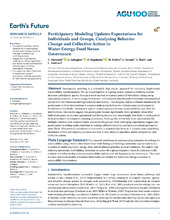| dc.contributor.author | Kimmich, Christian | |
| dc.contributor.author | Gallagher, Louise | |
| dc.contributor.author | Kopainsky, Birgit | |
| dc.contributor.author | Dubois, Marc | |
| dc.contributor.author | Sovann, C. | |
| dc.contributor.author | Buth, C. | |
| dc.contributor.author | Bréthaut, Christian | |
| dc.date.accessioned | 2020-06-15T12:25:39Z | |
| dc.date.available | 2020-06-15T12:25:39Z | |
| dc.date.issued | 2019 | |
| dc.Published | Kimmich, Gallagher, Kopainsky, Dubois, Sovann, Buth, Bréthaut. Participatory modelling updates expectations for individuals and groups, catalyzing be-havior change and collective action in nexus governance. Earth's Future. 2019:7;12:1337-1352 | eng |
| dc.identifier.issn | 2328-4277 | |
| dc.identifier.uri | https://hdl.handle.net/1956/22592 | |
| dc.description.abstract | Participatory modeling is a potentially high‐impact approach for catalyzing fundamental sustainability transformations. We test if participation in a group system dynamics modeling exercise increases participants' agency through a novel method to evaluate potential behavioral change using expectation measures. A water‐energy‐food nexus—a functionally interdependent but underconceptualized system with low consensus and high scientific uncertainty—was mapped, and its evolution simulated by 46 participants in three interventions in a region undergoing hydropower infrastructure development in Northeastern Cambodia. Participants' system‐related expectations were measured before and after the interventions. Our results suggest that participants became significantly more optimistic about their individual agency to increase agricultural and fishing income and, interestingly, less likely to participate in local government development planning procedures. Findings also reveal how some uncertainties for multiple variables were reduced within and across the groups. Such converging expectations suggest that participatory modeling could contribute to making collective solutions and institutionalized agreements more likely. This research contributes to innovation in sustainability because it unpacks some underlying mechanics of how participatory processes can lead to new adaptive capacities, shared perspectives, and collective actions. | en_US |
| dc.language.iso | eng | eng |
| dc.publisher | AGU | eng |
| dc.rights | Attribution CC BY | eng |
| dc.rights.uri | http://creativecommons.org/licenses/by/4.0/ | eng |
| dc.title | Participatory modelling updates expectations for individuals and groups, catalyzing be-havior change and collective action in nexus governance | eng |
| dc.type | Peer reviewed | en_US |
| dc.type | Journal article | en_US |
| dc.date.updated | 2019-12-20T18:02:41Z | |
| dc.description.version | publishedVersion | |
| dc.rights.holder | Copyright 2019 The Author(s) | en_US |
| dc.identifier.doi | https://doi.org/10.1029/2019ef001311 | |
| dc.identifier.cristin | 1763535 | |
| dc.source.journal | Earth's Future | |

